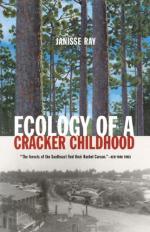
|
| Name: _________________________ | Period: ___________________ |
This test consists of 5 multiple choice questions, 5 short answer questions, and 10 short essay questions.
Multiple Choice Questions
1. What type of business did Janisse's grandfather Charlie run with his wife Clyo until he got into a fistfight that destroyed the structure?
(a) A pharmacy.
(b) An insurance office.
(c) A thrift store.
(d) A restaurant.
2. In what way was the Ray family different than everyone else in the Apostolic Church's congregation?
(a) They celebrated Christmas.
(b) They were the only family with fewer than eight children.
(c) They were the only white members of the congregation.
(d) They were the only ones who did not speak in tongues.
3. What is the official designation of the longleaf pine's status, as stated by the National Biological Service?
(a) Virtually extinct.
(b) Critically endangered.
(c) Extinct.
(d) Endangered.
4. What does the term bricoleur mean?
(a) A term given to folk recyclers, those who find purposes for castaway objects in which others cannot see a value.
(b) A term given to a manipulative person.
(c) A term given to someone who cannot see a situation from another's perspective.
(d) A term given to a bread-maker who uses only natural ingredients.
5. What was the catalyst for the "opening" of Janisse's heart referenced in the chapter title How the Heart Opens?
(a) Her fascination with the carnivorous pitcher plant.
(b) Her brother's decision to become a minister.
(c) Her father's healing from his mental illness.
(d) Her discovery of her love for painting.
Short Answer Questions
1. What number child is Janisse within her family?
2. When Janisse and her brothers used to play school, with Janisse often acting as the teacher, what did they use as a chalkboard?
3. At the hands of the tree farmers, the land was laid bare. What simile does Janisse use to describe its bare state?
4. Janisse describes her area of southern Georgia as lying below the fall line. What does she say that fall line serves to separate from one another?
5. In what county in Georgia was Janisse raised?
Short Essay Questions
1. On page 79, Janisse includes the text of a letter her father Frank wrote to her. In the letter, Frank wrote that he was thankful for his mental illness and that it had taught him seven lessons. What were three of those lessons he said mental illness had taught him?
2. Janisse said there was only one type of occasion that did not elicit shame from her role as a junkyard owner's daughter. What is the only thing that occurs that does not bring her shame?
3. What is the effect on the reader when in the chapter entitled Junkyard, Janisse writes, "I was six the year mental illness stole my father," (77) and how does the author create that effect?
4. What happened during one of the Ray family's only vacations that highlighted the fact that they were a subject of fascination for others?
5. After explaining that "Ninety-eight percent of the presettlement longleaf pine barrents in the southeastern coastal plains were lost by 1986" (16), Janisse writes that she did not know about this loss as a child. However, she states, "But it is a loss that as an adult shadows every step I take" (16). What does she mean?
6. How does Janisse describe her feelings toward her father when he was mentally unwell?
7. How does Janisse Ray use her great-grandfather Pun's career progression to show how white-collar jobs can be even more damaging to the environment than can blue-collar jobs?
8. Due to their parents' religious beliefs and their resulting family rules, what were some of the practices forbidden to Janisse and her siblings?
9. Why did Janisse look forward so much to the days when Frank shopped at Winn-Dixie?
10. How does the Thingfinders Club play into the memoir's message regarding ecology?
|
This section contains 1,511 words (approx. 6 pages at 300 words per page) |

|




